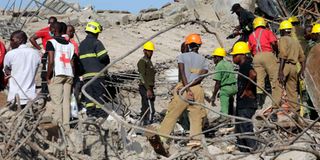Ensure quality of works to prevent building collapse

Rescuers at Coptic, Kisumu County, where a four-storey building collapsed last September.
Research by the National Construction Authority (NCA) shows Kenya has suffered more than 50 cases of building collapse that killed at least 200 people and cost the economy over Sh2.4 billion since 1996.
Causes include poor workmanship; substandard material; poor structural design; non-compliance with statutory and safety requirements; and inadequate maintenance.
The National Building Inspectorate has summarised the general causes of collapse to include unprofessional design, leading to inadequate designs; poor construction methods; poor drainage systems; poor mix design and lack of curing for concrete; man-made disasters such as bomb blasts; and natural disasters like earthquakes and landslides.
Construction
Research also shows more privately owned than government buildings have collapsed.
Studies show buildings collapse largely due to human factors of omission or commission. This means it is possible to eliminate or significantly reduce these incidents if we take the necessary measures.
Despite sufficient legal frameworks for regulation of the industry, there are gaps in the enforcement. Ordinarily, the construction process begins with an idea. The developer or owner then seeks a professional to design the building, and later approval for the designs at the county planning department.
Counties assess and, if satisfied, approve the construction. The projects are also submitted to NCA for a certificate of compliance. There are other players in between but counties are central as their role doesn’t end with the approval.
Quality standards
They are mandated to carry out inspections of buildings within their jurisdiction to ensure compliance with quality standards and adherence to the conditions issued during approval. But some counties don’t have a registered structural engineer, meaning not all approvals are professionally reviewed; approvals are done for revenue, not necessarily their value.
Buildings don’t collapse due to inadequate architectural design but structural inadequacy. Structural design determines whether the building will be structurally sound or not.
A registered and licensed structural engineer should lead the checking of all the drawings and issue a certificate of compliance at completion of the construction. Without it, the county should not issue a certificate of occupation.
That will cure several things. One, it will ensure counties properly resource the approval process. Two, the approval will add value to the building supply chain.
Three, all buildings will be supervised by qualified persons to ensure the wrong methods are avoided. Fourth, and last, certification by registered and licensed engineers by Engineers Board of Kenya (EBK) will ensure proper designs and specifications are done by suitably qualified professionals.
Where they don’t have internal capacity, counties should outsource the services of registered and licensed structural engineers. That will ensure that only structurally sound buildings are approved.
Mr Kiteme is a civil structural engineer. [email protected].





